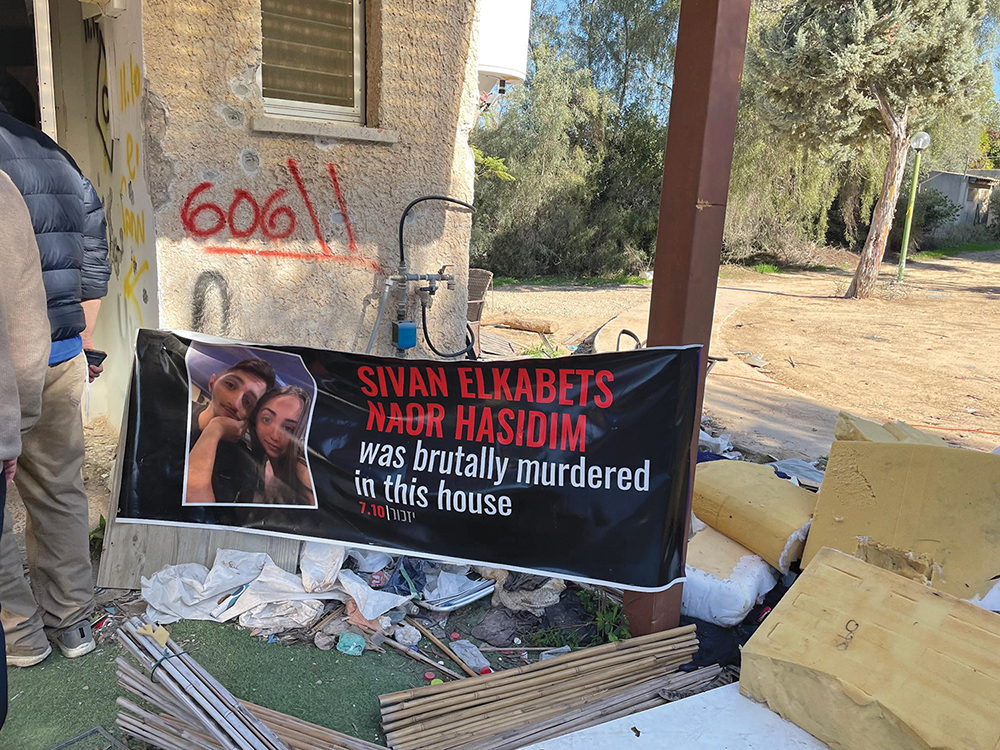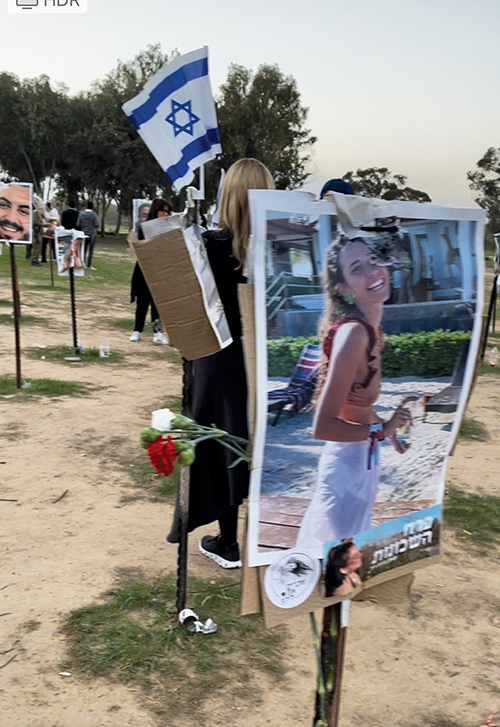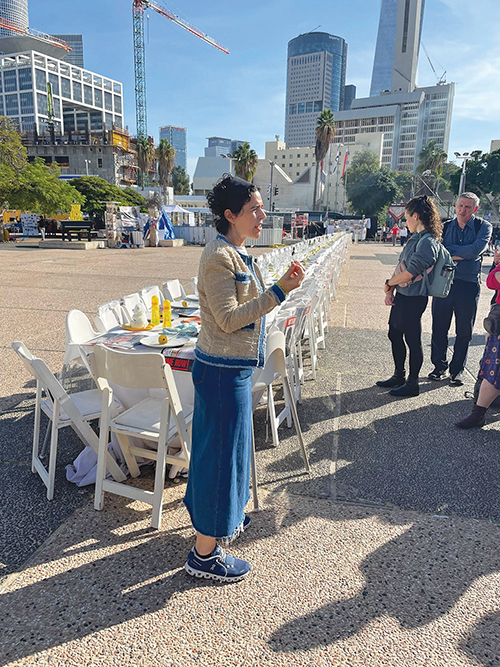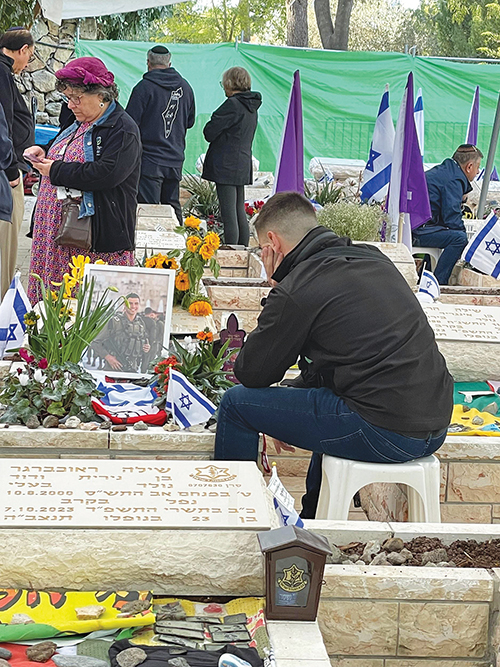
Last week, Jofa (the Jewish Orthodox Feminist Alliance and Yeshivat Maharat brought over 30 people on a mission to Israel to give chizuk and support. In fact, we got so much more than we gave.
We went to bear witness.
The quintessential affirmation in Judaism is the Shema: “Hear O Israel, the Lord our God, the Lord is One” (Deut. 6:4). In the Torah, The ע and the ד in this verse are written larger than the other letters. Put together, these letters spell עד (or witness). The tefillah where we cover our eyes actually means that we cannot bury our head in the sand and close our eyes to the darkness and sadness of the world around us. The Shema is calling on us to be an עד, to stand up and bear witness.
This requirement is not a passive act. Bearing witness leads to action, which manifests in several ways.
Bearing witness means continuing to pray.
At several points throughout our mission, we paused to daven. In Kikar Hatufim, we recited the misheberach for the return of captives after listening to Shelly Shem Tov praying for the return of her son Omer. We davened with Natalie Ben Ami, begging for the return of her father Ohad. We said an El Maleh memorial prayer at Har Herzl, crying for the young soldiers, men and women, who died in battle. In front of one grave was a young soldier bent over the grave of his commander, Roi Nehadri.
Roi died on Oct. 9. I didn’t know Roi, or his friend, but I stood next to him trying to hold his pain. The soldier told us that as Roi fell he raised his fist, as if to offer a final message: Am Yisrael Chai. The nation of Israel lives.

Bearing witness means holding peoples’ stories of pain.
We met Dr. Cochav Elkayam-Levy, who has been tasked with documenting the sexual violence committed against women on Oct. 7. For the last few months, she has been inundated with the most tragic stories of devastating destruction and mutilation. She has become tasked with convincing the international community that Hamas’ actions were highly coordinated and purposefully violent against women and their bodies. We watched her break down. We offered to hold her hand, listen and share a bit of the pain, giving her small moments of relief from the constant deluge of darkness.
Bearing witness means retelling the stories of heroism.
There were so many heroic stories. Mothers in Kfar Aza who placed their bodies over their children, saving their lives. Of children hiding underneath beds and in closets for hours. Parents who left their children to go out and fight. Soldiers who volunteered to show up, even if they didn’t have to. Wives who were stuck at home with children, waiting for their husbands to return. Parents praying that they would not get that dreaded knock from the army telling them that their child had been injured, or worse, murdered. Therapists who remind soldiers that there will be a tomorrow and a tomorrow after that. The spirit of volunteerism t is inspiring. The country is united around the herculean task of defending their land, no matter what the cost.

Bearing witness is about activism.
Many have concluded that this is the war where women have broken through multiple glass ceilings. The question about whether women can serve in combat units has been answered. A female IDF tank crew eliminated dozens of Hamas terrorists on Oct. 7. Then there are the tatzpaniot, young female “spotters” watching borders and villages. These soldiers knew something was happening leading up to Oct. 7. Their calls to the army leadership were ignored. Many of their peers were among the first who fell. Today their job has been elevated, its importance revealed. On our trip, we watched them work, their eyes trained on computers scanning Israel’s borders for danger.
As we walked through Kfar Aza, we saw pictures of a smiling young couple, Sivan and her fiance, next to pictures of their bloodied belongings. We saw the final WhatsApp messages between Sivan and her family, where her father writes at 12:21 סיווני, Sivani. And then again at 22:40, סיווני. Sivani could not respond.
I tell these stories, because perhaps this is my service. This is what a chayal named Ravid told me. He said: “I know that I am in uniform and am literally on the front. But you have a front as well. You can also do your service and do your part. You can take these stories home. You can tell the U.S. what you saw. That’s how you can wear your uniform.”
Bearing witness means finding moments of light and hope.
Out of the ashes, there were also glimmers of hope.
We saw Rabba Anat Sharbat, who shows up every Shabbat to lead Kabbalat Shabbat and Havdalah at Hostages Square, where she hugs and holds families who can’t pray themselves.
We danced with chayalot at their base laughing together with joy.
We even heard words of hope from Sarit Zussman, who buried her son Ben just a few weeks ago. Tears are inevitable, she said, but through Ben’s memory, she also finds emunah, faith, and tikvah, hope.
We volunteered at Yad Mordechai helping farmers save their produce. We were bussed over to deceivingly beautiful lemon trees. The lemons were past their prime and could no longer be sold. Our job was to pick the lemons and then throw them on the ground.

What a poignant metaphor for so much that was lost. I felt like crying every time I threw a precious lemon to the ground. But Yehala, whose farm we were working on, told us that discarding the lemons was necessary to ensure the fruit would grow again. Destruction would somehow, in time, allow for rebirth.
Rabba Sara Hurwitz is co-founder and president of Yeshivat Maharat and rabba at The Bayit- The Hebrew Institute of Riverdale.












